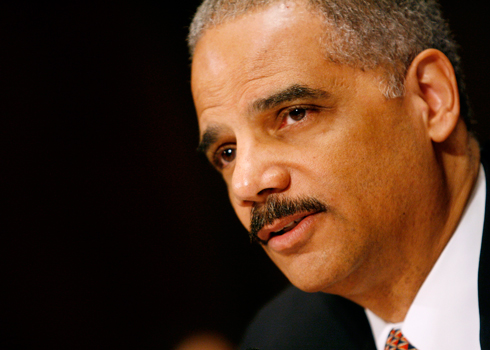The Obama Administration is applying an old exception to the Miranda rule in a new way in order to interrogate terrorism suspects before reading them their rights, several experts tell TPMmuckraker, finding what one law professor calls a “middle ground” between those who want suspects put through the criminal justice system and those who believe they should be classified as “enemy combatants.”
Federal agents questioned both Faisal Shahzad, the man accused of planting a makeshift bomb in Times Square, and Umar Abdulmutallab, the failed Christmas Day bomber, under the so-called public safety exception to the Miranda rule for substantial periods before informing the men of their right to remain silent, and to an attorney.
Information gleaned during questioning under the public safety exception — in which police “ask questions reasonably prompted by a concern for the public safety,” according to the 1984 Supreme Court case that recognized the exception — is admissible at trial.
“It looks like to me they’re trying to find this middle ground between saying the Constitution applies with full force and the Constitution doesn’t apply,” says Sam Kamin, a professor of criminal law and procedure at Sturm College of Law in Denver who has written about terrorism interrogations. “It seems to be a deliberate strategy.”
Asked about the use of the public safety exception, a federal law enforcement official tells TPMmuckraker: “There has been no change in the long-standing law on Miranda or in the FBI’s current policy governing use of Miranda, which was issued during the prior Administration.”
None of several experts on Miranda interviewed by TPMmuckraker knew of publicly reported use of the public safety exception in a terrorism case during the Bush years, a fact supported by a Nexis search. And they say the length of the pre-Miranda interrogations in the two recent cases — 50 minutes and a few hours respectively — also appears to break new ground.
The expanded use of the exception isn’t likely to quell GOP criticism of the Obama Administration over Miranda; it has continued apace despite the fact that Shahzad kept talking after he was read his rights. But the new tack could raise the hackles of civil libertarians worried about the erosion of Miranda.

At a Senate hearing Thursday, Attorney General Eric Holder addressed the use of the exception in an exchange with Sen. Diane Feinstein (D-CA)
“There are exceptions to Miranda and that is one of the ways in which we conduct our interrogations of terrorism suspects, it’s what we did with Abdulmutallab, it’s what we did with Shahzad,” Holder said. (See video below)
As Holder went on to note, the Supreme Court, which recognized the public safety exception in the 1984 Quarles case, has never laid out how long questioning can last under the exception.
But, says Todd Foster, a criminal Tampa defense attorney and former FBI agent and federal prosecutor, “you’re typically looking at something that’s done at the instance of arrest for a very short period of time — just a couple of questions: ‘Where’s the gun?’ ‘Do you have anything sharp in your pocket?’ Not like, ‘Let’s go through your pawn shop receipts for the last weeks.'”
In the Quarles case, for example, a woman told officers she had been raped and the assailant fled with a gun to a grocery store. One officer caught the man in the store, and, after noticing an empty holster, asked him where the gun was before reading him the Miranda warning. The suspect said he had hidden the weapon behind some empty cartons. The use of that statement at trial was challenged, but it was ultimately allowed by the Supreme Court.
In the Christmas case, agents questioned Abdulmutallab in his hospital room under the public safety exception for 50 minutes, beginning several hours after he was apprehended around noon in Detroit. He was ultimately read his rights about five hours later, after going through surgery, the AP reported.
“Useful, valuable intelligence was gained in that one hour,” Holder said Thursday. “A lot of people have said, you only spoke to him for about an hour — they say, 50 minutes — without recognizing that in that period of time qualified, experienced FBI agents can elicit really substantial amounts of information.”
In the Times Square case, the period of interrogation under the public safety exception “far exceeded” 50 minutes, Holder said. (Citing unnamed officials, the Los Angeles Times puts it at three or four hours.)

The federal law enforcement official tells TPMmuckraker that after the initial Shahzad interrogation, which lasted from late Monday night into early Tuesday morning, “he was eventually transported to another location, where he was provided with his Miranda warning, which he waived.”
Several law professors tell TPMmuckraker that such lengthy interrogations may stretch the bounds of the exception.
“They’re extending it, they’re pushing the outer limits,” says Foster.
Kamin, the Denver law professor, says a civil libertarian critic might see it as “using Miranda to clean up a confession.” And Brian Levin, professor of criminal justice at California State University, says “it’s a loophole that can really absorb the rule.”
Indeed, at the time of the Abdulmutallab case, the AP reported that after the 50-minute interrogation under the public safety exception, federal officials were worried that they may have overstepped their bounds and dispatched a “clean team” to read him the Miranda warning and begin anew:
By that time, FBI bosses in Washington had decided a new interrogation team was needed. They made that move in case the lack of a Miranda warning or the suspect’s medical condition at the time of the earlier conversations posed legal problems later on for prosecutors.
Here’s Holder discussing the exception Thursday:
Late 5/9/10 Update: Making the rounds on the Sunday shows today, Holder addressed Miranda, saying, “I think we have to give serious consideration to at least modifying that public safety exception.”






